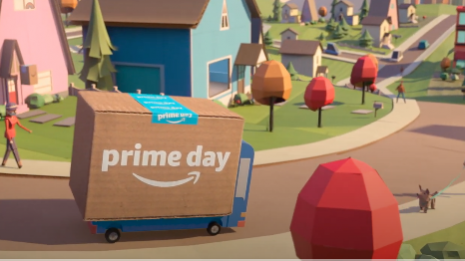 Amazon Prime Day 2020 will be Oct. 13-14. Image credit: Amazon
Amazon Prime Day 2020 will be Oct. 13-14. Image credit: Amazon
Ecommerce giant Amazon will host its sixth annual Prime Day Oct. 13 and 14, an early start to the holiday season as luxury brands consider how to maintain their most affluent customer base during a challenging year for retail.
On Oct. 13, the online retailer will open its “doors” to one of the most anticipated retail shopping events of the year. Exclusively available to the company’s 150 million members, Amazon is expected to generate nearly $10 billion in total sales during the 48-hour event.
"The biggest difference this year is the timing of the event, which has implications on both the demand side — how consumers will react to a second Q4 shopping holiday, and on the supply side — whether brands can accurately forecast demand for two separate Q4 holidays," said Jeff Coleman, group vice president of marketplace channels at Tinuiti, San Diego.
What is Prime Day?
Prime Day is an annual deal event exclusively for Prime members. The event will feature 48 hours of incredible savings on thousands of items across all product categories from both small businesses to well-known brands.
For its first five years, Prime Day occurred in July, but due to the COVID-19 pandemic the date was pushed back to October— a date much closer to Black Friday. Some have speculated that Prime Day 2020 will mark the beginning of this year’s holiday shopping season, as opposed to the typical Black Friday kick-off.
 Amazon Prime Day 2020. Image Credit: Amazon
Amazon Prime Day 2020. Image Credit: Amazon
"Prime Day and Black Friday are close enough together that there isn't enough time in between for many brands to re-order inventory if they sell more than expected on Prime Day," Mr. Coleman said.
"In a normal year it can be difficult to find the right inventory mix to maximize sales without overstocking," he said."That challenge gets exacerbated when there's an unexpected retail holiday, not to mention one in the midst of a pandemic."
As shoppers are remaining cautious with their health and safety regarding the pandemic, online retail has skyrocketed this year.
According to a survey conducted by Tinuiti, 44 percent of shoppers would take care of at least some of their holiday shopping on Prime Day, while 17.5 percent say they would finish their lists.
Amazon Prime Day 2020
Many luxury brands do not typically take part in massive discount events such as Prime Day or Black Friday, therefore they must implement unique strategies for maintaining their customers who are bombarded with low prices.
"While Prime Day is geared specifically towards deals and discounts, there are other ways to take advantage of the increase in traffic on Prime Day," said Mr. Coleman. "Even if you're a luxury brand that isn't discounting your products, others in your category probably are.
"You can target customers during and after Prime Day to reach new customers in the weeks that follow."
A foundational element of luxury branding is the shopping experience. While Amazon utilizes the click-and-buy model, luxury brands create a culture surrounding product selection.
"Many categories are going to see a large influx of shoppers," Mr. Coleman said. "Identify key search terms that might capture relevant customers for your brand, and get them off the search pages with a sponsored ad that takes them directly to your store where you control the experience they have."
While it could be coincidental that pandemic regulations might make this an outstanding year for Amazon, it is also worth considering the rapid trend toward online retail in all sectors — luxury included.
Is Amazon the next stop for luxury?
Luxury retail is founded on the premise of experience and the culture surrounding brands rather than the speed at which it arrives at your door. However, with both the presence of Amazon and a general shift in shopping methods, brands will need to strategize omnichannel approaches to reach the changing market.
Luxury brands have steered clear of Amazon due to the heavily promotional retail environment and the positioning of the site as a place to get discounts, which has only grown stronger since Prime Day began. If a brand has fostered a following by emphasizing the customer experience or by creating hype through limiting access and supply, then joining an Amazon platform could devalue the brand in the eyes of those who are already loyal (see story).
While there was much skepticism about the migration of luxury retail to an online environment, the ecommerce segment of luxury is now growing at a faster rate than the overall business. Depending on the types of luxury brands Amazon targets with its digital platform, consumers will shop on Amazon for brands that were not otherwise providing a larger experience (see story).
The consensus from experts is that luxury retailers should not shy away from occasional sales events. For instance, department store Nordstrom is a high-end retailer whose annual sales event precedes Amazon by decades. Dating back to the 1960s, the Anniversary Sale is the retailer's biggest shopping event of the year. Every summer, the Anniversary Sale offers discounts on fall arrivals. Nordstrom sees the sale as an opportunity to engage shoppers across a variety of price points and styles (see story).
Quote:
